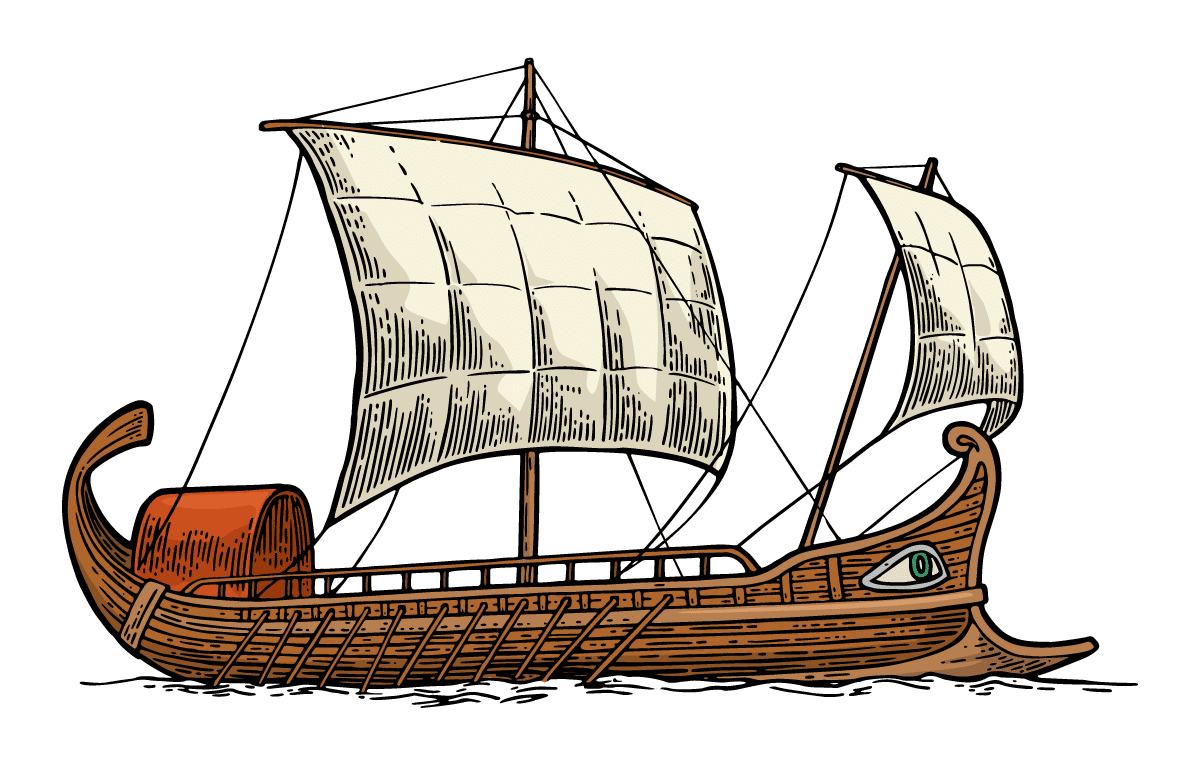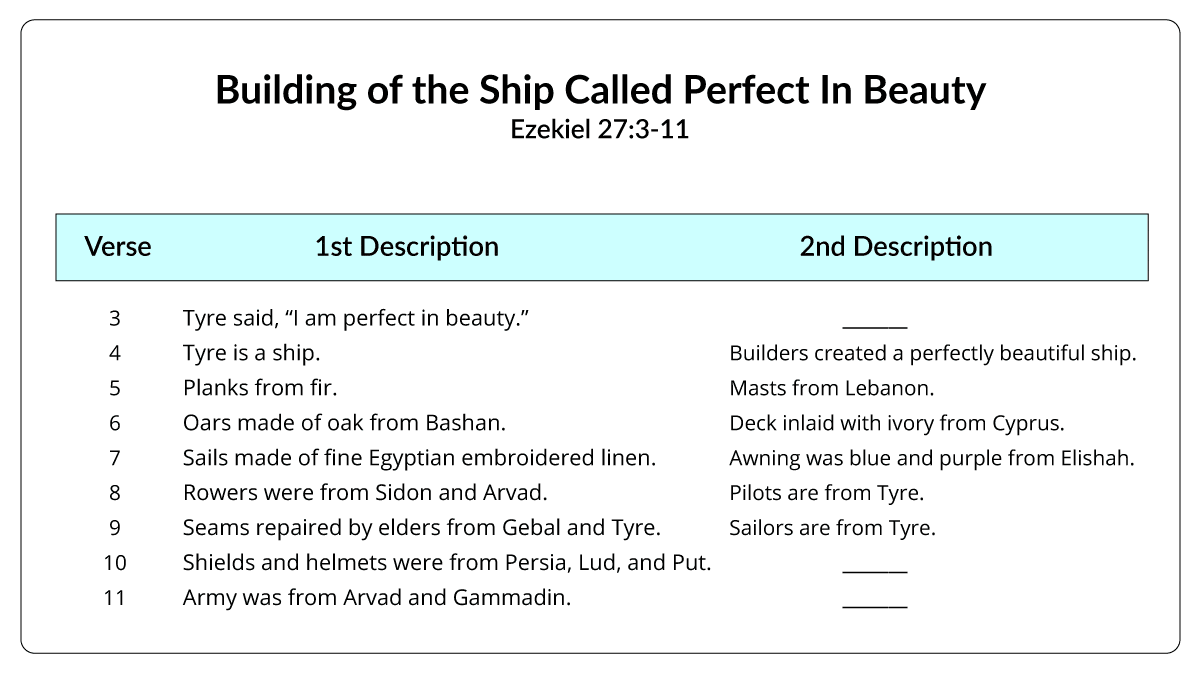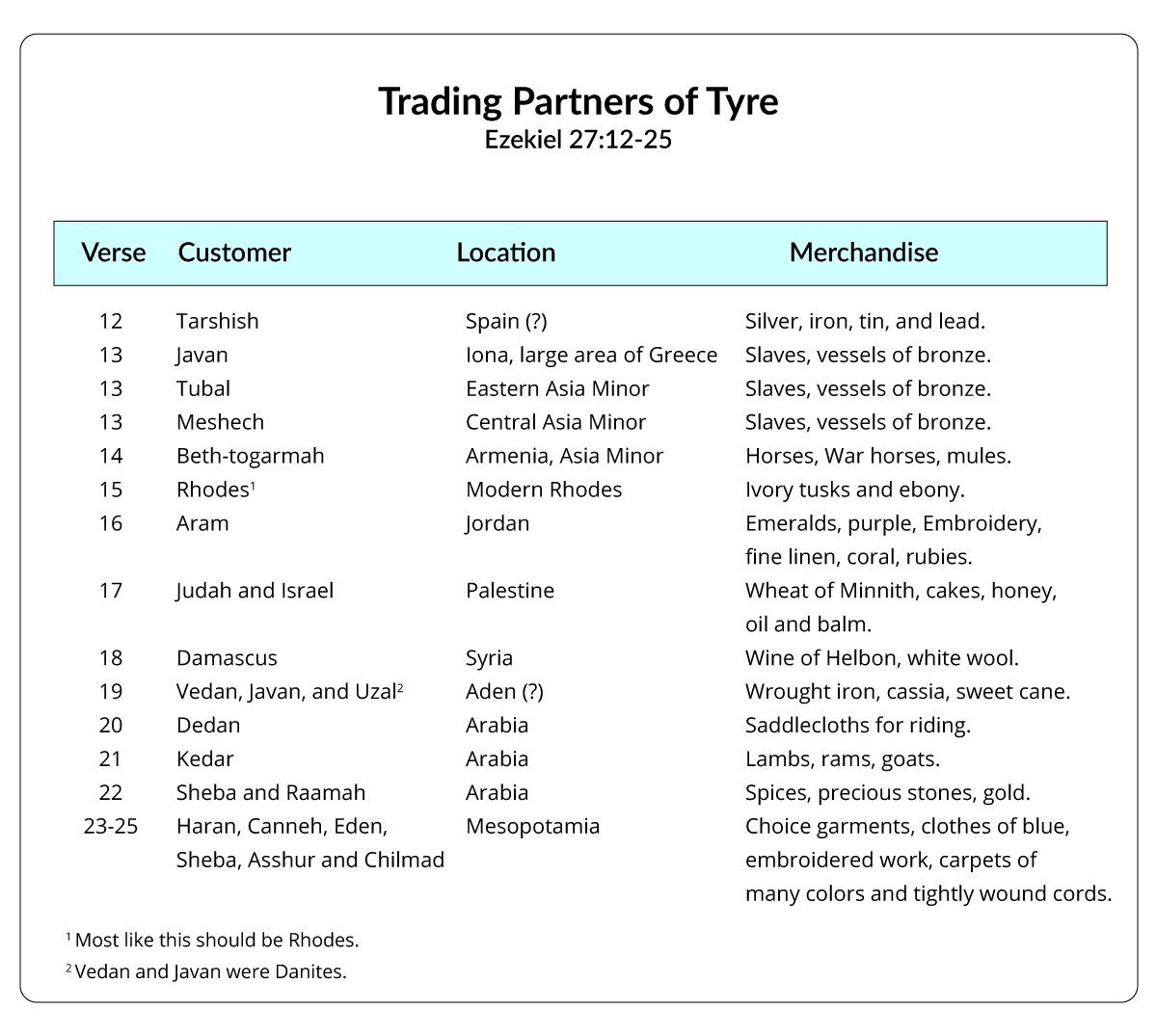
Phoenician Trireme Boat of the 5th Century
In chapters 25 and 26 of Ezekiel, we discovered that the Lord punished four nations because they rejoiced when they learned God was punishing Jerusalem. They were antisemitic. A fifth nation declared that there was nothing special about Israel. That nation was anti-Judaism. This reminds me of a time when I was a little boy sleeping in my bed. Suddenly I woke up because my father was spanking me. I asked why was I being spanked? My dad said that I was laughing at my brother because he was being spanked for doing something wrong. My father followed the biblical principle that if we rejoice because our enemy is suffering, then the Lord will discipline us. Now I do not know if my father knew about the biblical principle, but he knew that what I was doing was wrong. So, Ezekiel 25-26 told us about five nations God planned to destroy because they rejoiced when Yahweh punished them. Those nations were Ammon, Moab, Edom, Philistia, and Tyre.
Our study is a continuation of the destruction of the nation of Tyre. We learned in Ezekiel 26 that Tyre was being punished because they had rejoiced Jerusalem was being punished. Ezekiel 26:2a says,
“Son of man, because Tyre has said concerning Jerusalem, ‘Aha, the gateway of the peoples is broken; it has opened to me. I shall be filled, now that she is laid waste,’ therefore thus says the Lord GOD, ‘Behold, I am against you, O Tyre . . .’” Ezekiel 26:2-3a (NASB)
Tyre was very happy that Jerusalem was being destroyed. We discovered in our previous study of Ezekiel 26 that the major sea trade routes were controlled by Tyre and the major land trade routes went through Jerusalem. So, Tyre saw Jerusalem’s destruction as providing a great advantage for them to gain more wealth. Consequently, they were thrilled the Babylonian army had invaded the land and that Jerusalem would soon be destroyed.
So, Yahweh then planned to destroy Tyre. As a result, one year later the Babylonian army attacked Tyre in 585 B.C. as God’s punishment for their cursing of Jerusalem God’s chosen people, and His city Jerusalem. Chapter 26 prophesied that King Nebuchadnezzar’s army would destroy the portion of Tyre that was on land. The prophecy also said that Alexander the Great’s army would destroy the island of Tyre. That occurred in 332 B.C. Today, the ancient ruins of Tyre are a proof the prophecy was real and true.
Introduction to Ezekiel 27
That was the background to our study. This study is about Ezekiel 27. It is a lamentation over the nation of Tyre. We are going to discover the root sin that caused Tyre to rejoice that Jerusalem was being destroyed. Verses 1-2 introduce the chapter. We read,
Moreover, the word of the LORD came to me saying, “And you, son of man, take up a lamentation over Tyre . . . Ezekiel 27:1-2 (NASB)
Verse 1 tells us that Yahweh commanded the prophet Ezekiel to take up a lamentation over Tyre. The Hebrew for lamentation is qina. I did not check all of the English dictionaries for their meaning of the word lamentation. But I did find that the English definitions I read for lamentation miss the meaning of the Hebrew word. The correct meaning of the Hebrew word for lamentation, qina, refers to a poem of bereavement that was sung at a funeral (Amos 8:10). The emphasis is upon a song whose lyrics are a poem. So, Yahweh wanted the prophet to sing His lamentation. Yahweh’s song was a sad poem about the destruction of Tyre. What is especially interesting is that the song is sung before the city is destroyed. That means the prophecy was certain and true.
It is important that we not miss the fact that this lamentation is Yahweh’s sad song. This gives us an important biblical principle at the very beginning of our study. God mourned the destruction of the very city that He was destroying. We have already read in Ezekiel 18:32 that God does not take pleasure in the death of any unbeliever. We will read later in Ezekiel 33:11 that God does not take pleasure in the death of the wicked. God repeated this truth so that we do not miss it. Now here is an illustration of that fact. God did not take pleasure in the death of Tyre. But He had to destroy them because of their sin. So, the principle to remember is that God’s justice and holiness demands that He punish sin, but He does not enjoy doing it. The lamentation reveals His unchanging character.
So what did God say in His lamentation? The lamentation is divided into three divisions. Verses 3-11 is “Tyre, the Ship Called Perfect In Beauty.” Verses 12-24 is “Tyre’s Many Commercial Partners.” Verses 25-36 is “The Sinking of the Perfect Ship.”
Tyre, Ship Called Perfect In Beauty (v 3-11)
Verse 3 says,
. . . and say to Tyre, who dwells at the entrance to the sea, merchant of the peoples to many coastlands, ‘Thus says the Lord GOD,
“O Tyre, you have said, ‘I am perfect in beauty.’”
Ezekiel 27:3 (NASB)
We are told that Tyre was a merchant for the peoples of many coastlands. Tyre controlled the sea routes and was a major supplier of merchandise to many nations.
Then the Lord God said, “O Tyre, you have said, ‘I am perfect in beauty.’” Now we discover the reason why Tyre was happy that Jerusalem was being destroyed by the Babylonian army. They were proud. They believed they were “perfect in beauty.” Proverbs 21:4 tells us that pride is sin.
Haughty eyes and a proud heart,
The lamp of the wicked, is sin.
Proverbs 21:4 (NASB)
Usually one sin leads to another sin. This is especially true of the sin of pride. Ezekiel 30: 6 and 18 tells us that some people are proud of their power. 2 Chronicles 32:25 teaches us that proud people do not respond to kindness. Psalm 10:2 states the wicked pursue the poor because they are proud. 2 Chronicles 26:16 states that when Uzziah became proud, he “acted corruptly, and he was unfaithful to the LORD his God.” Psalm 123:4 says the proud despise others. The verse describes many people, racists, authoritarians, many politicians, some teenagers, some church leaders and pastors. I remember a pastor many years ago admitted that when someone in the church asked him for a favor and he did not want to do it, he would just tell the person that he would pray about it. Psalm 123:4 described him. He had contempt for others. Psalm 123:4 also describes ancient Ammon, Moab, Edom, Philistia, and Tyre. Tyre had contempt for others. Tyre believed it was perfect in beauty.

We must not miss Proverbs 16:5 which teaches that everyone who is proud in heart is an abomination to the Lord and they will be punished. It says,
Everyone who is proud in heart is an abomination to the LORD;
Assuredly, he will not be unpunished.
Proverbs 16:5 (NASB)
Consequently, pride eventually leads to suffering for Proverbs 29:23 says,
A man’s pride will bring him low,
But a humble spirit will obtain honor.
Proverbs 29:23 (NASB)
James 4:6 and 1 Peter 5:5 says that God is opposed to the proud, but He gives grace to the humble. Then 1 Peter 5:6 warns us to humble ourselves under God. This teaches us that a humble person will submit to God and to others.
But Tyre was not humble. They considered themselves to be perfect in beauty. So, they violated Zephaniah 2:10 which warns us that God punishes the proud who abuse Israel. So, the lamentation in Ezekiel 27 is about proud Tyre who was going to be destroyed because they deserved it. This gives us another principle. God punishes the proud, especially the proud who punish Israel.
The lamentation illustrates this principle. Verses 4-11 describe the building of a ship. Each verse is about a part of the ship and its supplier. Each description is one of excellence. Verse 4 reveals the poem describes a ship and it states her builders constructed a beautiful ship.
Your borders are in the heart of the seas;
Your builders have perfected your beauty.
Ezekiel 27:4 (NASB)
When we are told her “borders are in the heart of the seas,” we are to understand that water surrounds her; that is, this is a beautiful ship that sails the seas. At the same time, this lamentation is describing Tyre since the ship symbolizes Tyre.
Beginning with verse 5 and continuing through verse 11, each verse describes one part of the ship and the nation that supplied the part. Each description is one of beauty. For example, verse 2 says the ship’s planks were supplied by Senir, which was the Amorite name for Mount Hermon (Deuteronomy 3:9). The trees from Senir were the finest pine trees available. The mast of the ship was made of cedar from Lebanon. The cedar trees were greatly desired for their height. Verse 6 says the oars were supplied by Bashan. The area was famous for its oak trees. The deck was boxwood inlaid with ivory supplied by Cyprus. Verse 7 states the sails were made of embroidered linen from Egypt and the awning that covered the deck was blue and purple from the coastlands of Elishah.
Verses 8-10 describe the various seamen on the ship. The rowers were from an island known as Arvad, which as off the cost of Syria (v. 8). The pilots were from Tyre itself (v. 8). The repairmen were from Gebal (v. 9). Verses 10-11 describe the military might on the ship that would keep it safe from pirates on the sea if attacked. The ship was the finest of the fleet. Yahweh’s message was that Tyre excelled above every other nation. It was truly a great commercial center.
Tyre’s Many Commercial Partners (v 12-24)
Verses 12-24 now describe Tyre’s commercial partners. Each verse describes a nation or territory and the merchandise that they supplied for sale. The verses reveal that Tyre bought and sold a magnificent variety of goods all over the Mediterranean Sea. It is reported that Tyre’s commercial enterprise included Great Britain. The purpose Yahweh gave us the long list is to impress us that Tyre was a magnificent city and nation.

The Sinking of the Perfect Ship (v 25-36)
Verses 25-36 now describe the sinking of the perfectly beautiful ship. Verse 25 says,
“The ships of Tarshish were the carriers for your merchandise.
And you were filled and were very glorious
In the heart of the seas.”
Ezekiel 27:25 (NASB)
Tyre was truly glorious on the seas, and consequently, she was filled with pride. But verses 26-27 prophesy bad news.
“Your rowers have brought you
Into great waters;
The east wind has broken you
In the heart of the seas.
Your wealth, your wares, your merchandise,
Your sailors and your pilots,
Your repairers of seams, your dealers in merchandise
And all your men of war who are in you,
With all your company that is in your midst,
Will fall into the heart of the seas
On the day of your overthrow.
Ezekiel 27:26-27 (NASB)
Verse 26 says an east wind would destroy the ship of perfect beauty. The east wind refers to both the Babylonian army and Alexander the Great’s army. The Tyre on land would be destroyed first by the Babylonian army, and the Tyre on the island by the army of Alexander the Great.
Then the last part of verse 27 says everything will fall into the heart of the seas. When that occurs, Tyre will be overthrown. Then verse 28 says that when Tyre’s pilots cry out about the disaster, the whole commercial enterprise will shake like an earthquake. As a result, the oarsmen (v. 29) and the sailors (v. 29) will abandon ship and remain on the land.
Verses 30-32 describes the mourning of the nations because of the destruction of Tyre. Verse 32 says the people will take up a lamentation over Tyre. Verse 31 says there will be bitter mourning.
In verses 33-35, the people and the merchants who once were satisfied with the wealth from their commercial enterprises and who made kings wealthy are now unhappy. The entire commercial system had been destroyed. They had trusted her and it will be destroyed. Verse 35 says the kings were afraid. Maybe that refers to the uncertainty of life. The merchandise they had purchased could not be purchased now and perhaps they were now afraid that the Babylonian army or the army of Alexander the Great would come after them next.
Verse 36 concludes the lamentation,
The merchants among the peoples hiss at you;
You have become terrified
And you will cease to be forever.
Ezekiel 27:36 (NASB)
The ship once perfect in beauty would sink and be no more. That is, Tyre would cease to exist because of its pride.
Conclusion
This gives us our third principle. God punishes the proud, but He does not enjoy it. God lamented the destruction of Tyre.
In closing I would like to quote from Ralph Alexander who wrote this in his commentary on Ezekiel,
How quickly the proud fall! Materialism and wealth, which seem so attractive, often make men prominent in the eyes of others. But God hates pride and materialism. Those who think of themselves as important will quickly fall before the judgment of God. Tyre found this out. She would exist no more![1]
Tyre was like the United States of America. It is also like the final world empire during the tribulation which will be destroyed and cease to exist at the second coming of Christ. Tyre is a warning to us and the world system today. God hates our pride.
References:
1. Ralph H Alexander. Ezekiel. The Expositor’s Bible Commentary. Regency Reference Library. 1986. . p. 936.